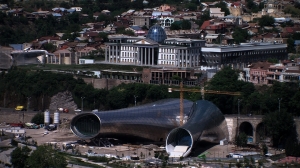Petek, 17.10. // 20.00 // Vstopnina: 2 evra
// premiere se bo udeležila avtorica filma Ana Pečar
DODATNE PROJEKCIJE: Sreda 29.10. ob 20.00 in Ponedeljek 3.11. ob 20.00
IN THE RED
Ana Pečar, Oliver Ressler / 2014 / 20 min
“In the Red” je film o skupini Strike debt, organizaciji, ki se je formirala med Occupy Wall Street protesti v New Yorku. Skupina je organizirana okrog teme dolga, ki predstavlja sredstvo kontrole in ekonomske moči. Strike debt vpeljuje in sproža razne aktivnosti s katerimi razkriva prikrite mehanizme finančnega kapitalizma. Podobno kot gibanje Occupy, je skupina organizirana v več interesnih podskupin: teoretična veja izdaja priročnik z naslovom ‘Priročnik z napotki za upornika dolgu’ za tiste, ki se nameravajo odpovedati svojemu dolgu. Skupina za dejavnosti organizira proteste, nudi brezplačno zdravniško pomoč in informacije o aktivnostih skupine. Skupina z imenom Rolling Jubilee (ime izhaja iz arhaične prakse, ko se je na vsako določeno obdobje odpisalo ljudem njihov dolg) pa odkupuje velike dele osebnega dolga, ki so ga banke odpisale, za zelo male vsote; potem ta dolg odpiše in tako osvobodi dolžnike njihovega dolga. S tem velikopoteznim dejanjem skupina Strike debt širi informacije o načinu delovanja drugotnega trga z dolgovi. Malokdo v ZDA namreč ve, da ko posamezniki več ne zmorejo plačevati svojih dolgov bodisi iz kreditnih kartic, posojil ali zdravstvenega zavarovanja, njihova banka navadno proda ta dolg nekomu tretjemu. Te kupčije se sklepajo za mali delež vrednosti dolga – navadno za 5 centov v vrednosti 1 dolarja – in podjetja, ki odkupijo dolg, le-tega potem terjajo od dolžnika in pri tem ustvarjajo visoke dobičke.
“In the Red” sledi skupini več mesecev ter se udejstvuje v intimnih pogovorih z njenimi člani. Skozi film je razviden skupinski način odločanja in snovanja.
THE PLUNDERING
A film by Oliver Ressler // 40 min, 2013 // with English subtitles
 “We can talk about the ‘plundering’ of Georgia. Public property, which in fact should serve the common needs of society, has become the property of individuals. For example, if that project became successful, the citizens now using this park would not be able to use it.” – Mikheil Svanidze, The Plundering
“We can talk about the ‘plundering’ of Georgia. Public property, which in fact should serve the common needs of society, has become the property of individuals. For example, if that project became successful, the citizens now using this park would not be able to use it.” – Mikheil Svanidze, The Plundering
Extreme levels of privatization can only be carried out under conditions where people are under severe pressure, as in the transformation of former Soviet republics towards independence and capitalism. Since the Rose Revolution in 2003, the former Soviet republic Georgia under went such a radical transformation. President Mikheil Saakashvili implemented one of the most extreme neoliberal projects in the world. Today, Georgia is 9th of 185 states in the World Bank ranking “Ease of Doing Business”. While the “common good accumulated within the communist regime during 70 years of its existence” (Rusudan Mirzikashvili, The Plundering) is being sold off, the unstable situation in a radical, free-market economy and the liquidation of most social safety nets drove most Georgian residents into un-experienced levels of poverty.
The film The Plundering focuses on four cases of aggressive, state-property privatization policies in Tbilisi. Through interviews, it discusses the privatization of the water system in Tbilisi and of Tbilisi’s popular market, the Dezerter Bazaar. A newly emerging movement prevented the attempted sell-off of the National Scientific Library, and the destruction and conversion of the historical Gudiashvili Square in Tbilisi’s city center into a shopping mall.
“Objects of strategic importance were sold to the benefit of some people close to the government”, Levan Asabashvili describes these processes of systemic corruption in the film. Usually the purchasers are hiding behind companies registered offshore.
CREDITS
Director and producer: Oliver Ressler
Camera: Niko Tarielashvili
Sound recording and film editing: Oliver Ressler
Sound design, mix and color correction: Rudolf Gottsberger
Music: Erekle Deisadze & Vinda Folio: Agurit Khelshi
Interviewees: Levan Asabashvili, Ani Chankotadze, Giorgi Chubinidze, Alexandre Elisashvili, Nino Gujaraidze, Lasha Kharazi, Zurab Kukuladze, Rusudan Mirzikashvili, Mikheil Svanidze
Translation: Soso Chauchidze
Organization and production assistance: Data Chigholashvili, Soso Chauchidze, Nini Palavandishvili, Ana Ramazashvili, Katharina Tchelidze
Special thanks to Nini Palavandishvili, Data Chigholashvili, Katerina Gregos, Luigi Fassi
The film was recorded in May 2013 in Tbilisi, Georgia in the framework of the GeoAIR Residency Program, commissioned by steirischer herbst festival, Graz and Art Sheffield 2013, supported by Otto Mauer Fonds and BMUKK.